WWE's King of the Ring tournament made a surprise return in 2019 and Baron Corbin was crowned the winner after a finals bout with Chad Gable, arguably the tournament's favorite.
The tournament has made sporadic appearances since 2010 with only three events held since in 2010, 2015 and most recently 2019. Despite being a prestigious tournament, the WWE for reasons best known to itself, has not decided to make this annual affair a regular setup.
However, we can look back to the long history of King of the Ring tournament winners, as well as others who have more symbolically carried the moniker of the king in WWE.
Not all kings are created equally. Despite winning the King of the Ring tournament and spending weeks to follow wearing a crown, Sheamus and Wade Barrett, for example, gained little from the gimmick. On the contrary, they looked a little silly and even anachronistic by the standards of the 2010s to the point that being king may have actually hurt them in the long run.
WWE has no plans for these former AEW wrestlers? Here's why!
However, there are those performers who have thrived with the king title, given the extra bit of credibility it offered or the way it has helped them stand out from the field of other Superstars.
The King of the ring tournament is often seen as a stepping stone for a mid-carder to gain legitimacy and become part of the main event title picture and hence the need to be crowned. king is amplified to that extent.
This article takes a look back at the top five kings in WWE history who have made the most of winning this prestigious tournament.
#5 Owen Hart
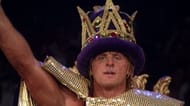
Though WWE had staged King of the Ring tournaments dating back to the 1980s, they only started televising them, let alone making them the focus of a pay-per -view, in 1993. In 1994, Owen Hart did a lot to elevate the concept when he was crowned the King of Harts.
Hart followed in his brother Bret's footsteps in fighting his way through the bracket. One of the key differences was that when Bret won the tournament, he was already a main event level talent, whereas this victory helped shore up Owen's spot as a guy who could legitimately challenge for a world title.
Hart played the part of king masterfully, too. Whereas his brother let the accomplishment of winning the tournament speak for itself, and didn't talk about it much afterward, Owen crowed about it incessantly to play into his arrogant and braggadocios heel persona. The king gimmick defined him just as he defined what being crowned king could mean in that era.
Owen defeated Razor Ramon in the finals and was crowned king.
Owen was largely in the shadows of his brother Bret Hart, who attained a 'superstar' status back in the day and this win helped Owen cement his place as a top competitor.
#4 Harley Race
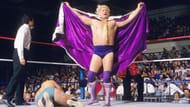
When Harley Race came to WWE, he was already an extremely well-established veteran of the wrestling business, having been the dominant traveling NWA World Heavyweight Champion for years. Rather than making it to WWE in the prime of his career as tends to be the case for so many wrestling stars, Race was instead in the twilight of his days as an active in-ring performer.
Race certainly still had the talent to still be positioned as a main event player. However, he came to WWE in the late 1980s, when the promotion was at its most cartoonish, eschewing the traditional sports-oriented underpinnings of the business in favor of kid-friendly characters. So, Race's old school persona didn't necessarily fit the mold, besides which he was at an advanced enough age that it wasn't as though WWE could hope to reinvent him for long term success.
WWE struck balance in pushing Race as the king. The gimmick paid homage to Race's legacy as an all-time great and one of the most decorated performers in wrestling history, without actually putting a traditional championship on him. Race wore the crown well, and it struck balance for him in the upper mid-card role he filled for most of his WWE tenure.
#3 Randy Savage
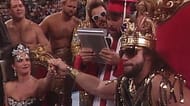
Coming out of his iconic feud with Hulk Hogan that peaked at WrestleMania 5, Randy Savage was shifting out of the world title picture for the time being, but remained one of the best all-round performers on the WWE roster. Becoming The Macho King presented a prime opportunity to celebrate Savage's place as a respected veteran with a distinctive persona, while not having to hold or challenge for the world title.
Savage played up his arrogant, royal heel identity masterfully to add a new dimension to his character. With a rebranded Queen Sherri by his side, Savage garnered heat nicely while progressing through storylines opposite the likes of Dusty Rhodes and The Ultimate Warrior. Savage even went so far as to use his royal scepter as a weapon, using it to memorably smash Warrior over the head and cost him his WWE Championship at the 1991 Royal Rumble pay-per-view, thus setting up their iconic showdown at WrestleMania 7. Savage would turn face from there, organically dropping his kingly identity as his character made a sharp turn as a good guy, a color commentator, and reunited with Miss Elizabeth.
The Macho King gimmick set a blueprint for how a heel needed to conduct himself and Savage was able to make the most of his polarizing image with the fans.
#2 Booker T
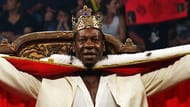
By 2006, King of the Ring was no longer a staple, annual part of WWE programming, WWE shrewdly brought it back, though, as a summer draw and a way of helping to distinguish and push Booker T in a new way.
Booker had been quite arguably the biggest WWE star to move directly into the WWE ranks when WWE bought its competitor in 2001. He garnered a well-deserved featured role for the next two years but floundered in the aftermath as he slipped toward the mid-card and came at increasing risk of getting lost in the shuffle. A heel turn had helped him get some direction. Becoming King of the Ring reinvented the man.
Booker's 2001 to early 2006 felt more like a coda to his WCW story than a worthy new chapter of his career. As king, however, Booker reinvented himself. Using a terrible put-on British accent and teaming up with his wife as his queen, Booker became one of the most compelling heels on the WWE landscape, including earning the chance at an extended World Heavyweight Championship reign.
He feuded with the likes of Triple H, The Undertaker & Batista and played the heel king role to the hilt.
#1 Jerry Lawler
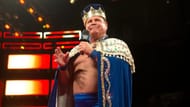
When it comes to kings of wrestling, it is difficult to argue that anyone is more synonymous with that identity than Jerry Lawler. Lawler won his crown in Memphis, before going on to reign with his royal identity for decades. You can add onto that a reign as AWA World Champion, and select appearances for other promotions and territories before he made his way to WWE in the early 1990s.
Lawler was far enough into his career, and established as not only a wrestler, but a promoter by the 1990s that WWE seemed to recognize more value in him as a color commentator than as an in-ring performer by that point. He did work several upper card programs, often opposite legends or guys on their way into or out of the world title picture. However, Lawler wound up finding himself most at home hosting his Kings' Court interview segments, as well as sitting beside Vince McMahon, Michael Cole, or, most famously, Jim Ross as a key voice of Monday Night Raw and other WWE television offerings.
Lawler would have a second life in the sports entertainment business in this role, with a newer and larger audience of fans coming to know him as the king of wrestling based on his mic work. While Lawler may not have accomplished as much in WWE as other kings, he is nonetheless inextricably linked to that identity forged well before he ever stepped into the WWE Universe.
The crown always accompanies Lawler either in the ring or in the commentary table.
How WWE has messed up John Cena's last run - Check here!

